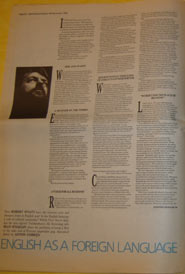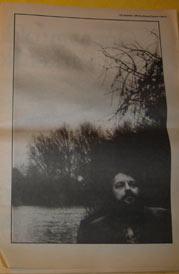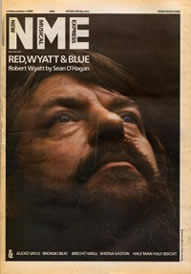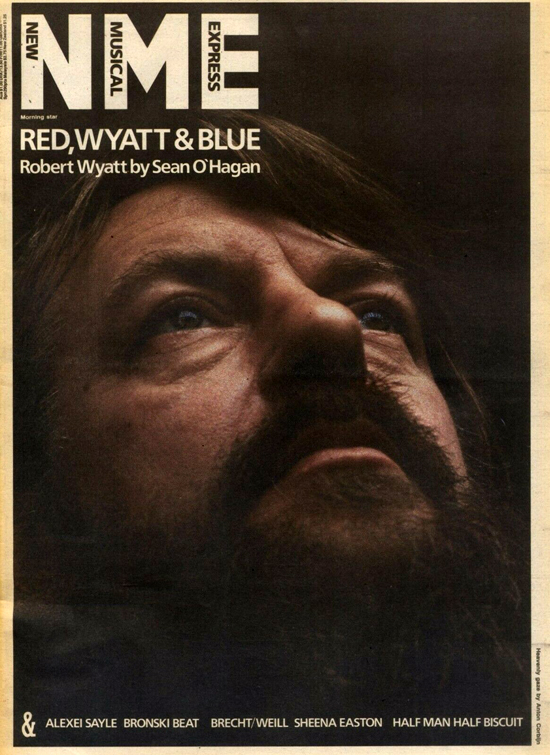| |
|
|
 English
as a foreign language - New Musical Express 14th December,
1985 English
as a foreign language - New Musical Express 14th December,
1985
ENGLISH AS A FOREIGN
LANGUAGE
| |
Does ROBERT WYATT have the sweetest voice and
sharpest brain in English pop ? Is the English language
a tool of cultural narcissism? Which Fleet Street
daily has the best tipster? Twickenham's Mr Rottenhat
tells SEAN O'HAGAN about the problems of being
a Red in the stale bed of Western imperialist pop.
Smoothed sheets by ANTON CORBIJN.
It seems like that voice has always been there. Raising
our eyebrows, bending our lips into smiles and, occasionally, knitting our brows in bemused wonderment.
A reassuring presence, this voice, but also, paradoxically,
a strange one. And, the ample evidence suggests, a
strangely affecting one.
|
|
For
such an emphatically English voice to spread out and embrace
such an eclectic international spectrum is further proof
of an imagination that recognises no borders. Songs as diverse
as Chilean poet Victor Jara's 'Te Recuerdo Amanda' and Elvis
Costello's 'Shipbuilding', as Ivor Cutler's 'Grass' and
Chic's 'At last I Am Free'.
Yet Robert Wyatt's voice,
its stately melancholy timbre, unites them all.
FITS AND STARTS
WAY BACK then there was Soft Machine, then an experiment
with Matching Mole. Then there was that accident. Silence.
Then the former jazz drummer underwent a startling and painfully
introspective sea-change - chronicled on'74's 'Rock Bottom'
LP - to emerge from the depths, shaken but stronger in resolve.
Both 'Rock Bottom' and its offspring, '75's 'Ruth Is Stranger
Than Richard', still stand as resonant, multi-layered, richly-hued
landscapes but, for a while, it seemed their maker. Another
silence ensued, broken, by of all things, a hit single.
Robert Wyatt even made Top Of The pops, singing 'I'm
A Believer' and, in the process, exorcised the ghost of
The Monkees as well. Then another cover: Chris Andrews'
60s opus 'Yesterday Man' underwent the Wyatt treatment.
After that, another silence.
A SPANNER IN THE WORKS
ENCOURAGED by his wife Alfie and Rough Trade's Geoff
Travis, Robert Wyatt returned in the late '70s with a
series of very different singles. Again cover versions
were the order of the day, again Wyatt imbued each song
with his distinctive breath. These singles - now collectively
known as the 'Nothing Can Stop Us' LP - contained only
one Wyatt original, the scathing 'Born Again Cretin',
but, more importantly, they announced a new intent, a
declaration of independence.
"Each song was chosen
on quite a consistent basis, all part of a conscious attempt
to make un-misusable music: music that couldn't be
appropriated by the Right. This is also why the new stuff
is much more straightforward. I was pushed into this by
an alarming occurrence: I was fiddling around on the short
wave radio when I heard one of my old songs being played
on one of those Western propaganda programmes - The Voice
Of America or Radio Free Europe. Blow me, I thought, I don't
want my music used in this way. So, I consciously set out
to make records where the ambiguity was removed, records
that would have to be rejected by anyone promoting Western
culture. Now I make sure I always put a spanner in the works.
A desperate move, but ..."
These spanners included
heart-wrenching 'Strange Fruit', a bizarre 'Stalin Wasn't
Stalling' (originally a patriotic American ditty), a Cuban
folk anthem ('Caimanera') and, just so no one could possibly
mistake his sympathies, a reading of 'Red Flag'.
Then the phone started ringing...
A VOICE FOR ALL REASONS?
"REALLY, I'D say Costello and Langer were the ones
who helped get my name known to the biggest audience.
'Shipbuilding' - that was the one that did it."
'Shipbuilding' is craftsmanship par excellence, the perfect, seamless grafting
of political content and songwriting style. The song's
deftly executed overview including the irony of working
class labour caught up in the imperialist wheels of industry,
is imbued with a sad, knowing stoicism and the tenor of
Costello's finest lyric fits Wyatt like a glove. Like 'At
Last I Am Free' before it, the song became Robert Wyatt's.
Over the past few years,
Wyatt's musical involvements have ensured a high profile:
one third of the vocal frontline of Working Week's inspired
'Vencermos' debut; a meeting with Ben Watt on the latter's
'Summer Into Winter' EP; the 'Trade Union' outing featuring
Bengali musicians Dishari; 'The Age Of Self' miners single,
also featuring The Grimethorpe Colliery Brass band; and,
finally, the celebrated Jerry Dammers-produced SWAPO
song, 'The Wind Of Change'.
|

|
Last year Wyatt issued his
own 'Work In Progress' EP which, alongside three more excellent
cover versions, included 'Amber And The Amberines', only
his second self-penned song in ten years.
"It's so bloody difficult
to do my own stuff: that's why I'd much rather do covers
or quite happily get roped into other people's projects.
I go into this state of trance when I'm working on my
own and really I have very little control of what I'm
going to come up with. The songs tend to suggest themselves
so the word 'creative' is a misleading one. For me it's
more like fishing, dangling a line over the keyboards
and hoping something will jump out at you".
OLD ROTTENHAT; THOUGHTS OF A RELUCTANT SONGWRITER
WHAT HAS "jumped out" is 'Old Rottenhat', an
LP of ten new, original compositions. Continuing his catalogue
of "un-misusable songs", 'Old Rottenhat' is,
on one level at least, Robert Wyatt's most straightforward
recording. Yet the targets he has chosen are slippery,
ambiguous ones; the treacherous duplicity of political
language, the lies that democracy depends on, the so-called
plurality of thought that Western culture contains and
the infectious spread of cultural amnesia. Behind this
array of inter-related topics lurks the spirit of Marxist
writer Noam Chomsky, that most mischievous disseminator
of Western capitalist mores and guiding light in Wyatt's
current way of seeing.
The music remains as haunting
and dreamlike as ever, yet here and there an accusatory
tone or caustic insight defines a certain shift of emphasis
and suggests an angry, spirited individual hides 'neath
this most gentle of men'. 'Alliance', the record's opening
statement, is a case in point - a song possessed of a
political critique and a personal sting: "You're
proud of being middle class (meaning upper class)/You
say you're self sufficient (but you don't dig your own
coal)."
"It's a reactionary song. What I'm reacting against
is being told that anyone who supported the NUM during the
miners' strike was a mindless thug. I've got a couple of
friends who, over the years, drifted towards the Alliance
and what was nightmarish for me during 1984 was that the
official opposition - as well as the usual right-wingers
who want to smash the unions good and proper - were all
so busy evading the issues. They all put pressure on the
miners to accommodate the state instead of vice versa and
really the reason the state have such an easy time is 'cause
the opposition is so namby pamby. That song is about being
painted into a corner called extremism; you're pushed
into a position because of the sheer unreasonableness of
mainstream alternatives."
"There are degrees of amnesia, ways to forget"
'The United States Of Amnesia'
CULTURAL AMNESIA: the process of selection that allows
nations to rewrite their past, highlighting the good,
erasing the bad. If Communist countries blatantly rewrite
their history to fit a post-revolutionary ethos, the West
is, as always, more subtle, more undercover. Chomsky
is continually pinpointing this slow, erosive fradulence,
as Robert eleborates:
"The liberal and right-wing
tradition here, and in the US, the big We, they have a
kind of smug consensus which you can see in their self-image
in the history books. This consensus gets its moral strenght,
as far as I can see, from the fact that everyone else
who tries an alternative seems to mess it up. Yet the
argument for Western democracy seems to rest on expedience.
I'm looking at what it means to be expedient all the time:
it's expedient to boast about one thing and forget about
something else.
"It still happens all
the time: take Western governments' involvement in the
Pacific, which never gets publicised. That's why I wrote
'East Timor'. Indonesia, with the West's backing, decided
to take East Timor and when the people reisted there was
genocide on a massive scale. We need the Pacific for a
source of constant cheap labour but we don't hear about
the people who are still fighting out there. Now people
say they are not interested in all these foreign problems,
but our taxes are financing this sort of thing - you can't
have it both ways. The song also concerns the very fact
that nobody has heard about East Timor. Subtle stuff."
'The Age Of Self' confronts
a different, no less pervasive form of amnesia: the constant
accusation that the Left is too tied to the past, too
fond of its heritage to be a relevant force today: "they
say the working class is dead, we're all consumers now".
"Yeah, well, I'm all
for progress on the Left but you don't do it by disowning
your past, by saying you're ashamed of the unions and
that. Telling the press we're really with-it now, we're
not boring old Lefties - always eager to accommodate them.
See, one of the things the Right have going is the continuation
of their own romantic myth. It's quite a legitimate stance,
actually. I think the Left should be like a family where
the feeling you have for each other transcends all the
pretty differences, and that strengthens all of you. It
shouldn't be: let's move forward and discard the industrial
workers. I think mutual affection is more in order..."
Is that why you turned out
to the Red Wedge launch?
"Yeah. People seemed surprised, but the musicians
asked for a bit of moral support and I came along. It's
good for the Labour front benchers to meet people like
that, though I didn't really qualify: I'm not a Labour
Party supporter and I'm definitely not a youth!"
"WORDS TAKE THE PLACE OF MEANING"
LANGUAGE, ITS open-endedness and malleability, is something
that has always tickled Robert's fancy but, where he once
used to play on words, he now draws attention to more
sinister types of word-play. 'Vandalusia' simply recites
a few well-worn phrases; terms that have slipped into
the English language as colonial archetypes and, through
constant mindless usage, have become separated from their
original, usually quite illuminating, meaning.
One of Robert's choices,
"beyond the pale", stems from Norman times when
the English "owned" one part of Ireland around
Dublin which they christened The Pale, originally meaning
'Boundary'. Now "beyond the pale" has established
itself as a phrase meaning "uncivilised" and
"outside the limits of decency". Interesting?
"My preoccupation is
to try and reclaim meanings from used words and see how
they function and it's very interesting indeed. Words
resonate and grow and get hi-jacked by one side or the
other, but now there's a distinctly unbalanced analysis
of language. Everyone is so careful not to use left-wing
swear words like 'fascist' carelessly, but the establishment
use all kinds of words so carelessly. 'Extremist' and
'terrorist' are two that spring to mind. In the White
House or the State Department a terrorist is anyone who
believes in having good schools and hospitals and decides
to do something about it. The media have to deneutralise
words, steal their meaning as part of a process of self-justification
for our method of democracy."
|

|
The inter-dependent
relationship between the right-wing government and their
press, in this country, has now reached ridiculous, yet
nonetheless exceedingly powerful realms. The press baron
has an unassailable powerbase that, unlike the politician,
isn't threatened every five years. The media can have
power without responsibility simply because the state
is dependent on them to such a degree: hardly the ideal
situation for democratic free speech to thrive.
"Well, if you consider
the idea of a 'terrorist', they never get a fair hearing
which is part of the reason they resort to such extreme
tactics. You ignore someone with a legitimate cause until
they take up a gun in order to be heard. Then you say
that you don't talk to gunmen. All the way along the line,
the establishment finds a reason for ignoring them: first
they're not powerful enough, then they get power and are
ostracised. Either way it's avoided. The media operate
on a rough consensus of who the goodies and baddies are
and that, of course, works very well for the people who
run the set-up."
ENGLISH AS A FOREIGN LANGUAGE
ROBERT WYATT is a soul caught in a bind: an unfortunate
accident of birth has made him (poor chap) indisputedly
English. He worries about this, as well he might, and
has my utmost sympathy. Try as he may he can't totally
escape the chains that bind him to Albion, althought his
Communist Party membership will be enough to get him disowned
in most quarters of this "liberal" land. Even
the CP, for all its internationalism, calls itself the
Communist Party of Great Britain: an unfortunate
case of colonialist infection.
"I feel like I could
be an internationalist but the paradox is my extreme Englishness
- I've desperately traced my family tree for some clues
but the fartherest we come from is Bolton! But I find
Englishness, the English language, forms an amazing power
group and for all its apparent broadmindedness, there
is a totally suffocating cultural narcissism which is
a real problem, not only for the rest of the world, but
also for our future. It is, quite simply, an inability
to allow other people, who aren't like us, the right to
live how they please. That's a problem I address right
from the first song.
"It's not just a right-wing
thing either but the unconscious racialism of the established
Left which also takes this maternal view of movements
around the world: telling other groups, in long essays,
how to run their revolutions. We should have respect for
people even though they makes mistakes."
Coming from a middle-class
background, Robert Wyatt is also familiar with the "cunningness"
of liberal ideology: the lack of direction disguised as
broadmindedness, the inability to make a stand and say
what you feel. This all adds up to a kind of political
paralysis, a "suffocation" as Robert would have
it, which means an "opposition based on consensus
rather than challenge, scared of even challenging the
fundamental, psychological notions that justify imperialism".
The song 'Gharbzadegi' is
interesting in this context: being both a critique of
'Englishness' and a classic example of language becoming
so analysed that it slips back into abstractness.
"First up, the very existence of the word makes me
laugh - I think it's an Iranian word meaning 'westernitis'.
I'd like to take this opportunity to say that the record
might have been called 'English As A Foreign Language',
because I'm, at once, incredibly English and also very
uncomfortable with it. So I keep trying to see Englishness
from an outsider's point of view. When I come across an
Iranian word that means 'westernitis' and sounds like some
weird disease, describing how people from other cultures
try and become like us... well, what a wonderful word!
The song itself is a tricky one, it's not a literal song.
It's near the end of the record because I'm on the verge
of giving up struggling with words by then."
"EVERY NIGHT I GO TO SLEEP, I ALWAYS DREAM IN
RED"
'Biko' from 'Work In Progress'
WITHIN THE graduations that constitute the Communist Party,
Robert Wyatt describes himself as "a Morning Star reader" and humbly suggests that if anyone wants
to define that description their best bet would be to
place an order for that august daily paper. It has, says
Robert, by way of further enticement, "the makings
of a good, all-round family newspaper: sympathetic to
the international labour movement with a pop column, a
gardening correspondent and the best tipster in Fleet
Street" (he is reliably informed).
On an artistic level, his
politics and his music are inseparable although he eschews
the role of demagogic educator so beloved of many agit-pop
stars.
"I don't bang my head
against the wall trying to make people see my way as the
only way. I'm more interested in trying to highlight certain
issues, identify groups who need help to be heard. I work
out where I stand on something and give my support accordingly,
but it's not my place to choose issues and thrust them
on people. Similarly I don't think we can tell South Africans
how to get rid of apartheid; they ask for your help and
support and you do what you can, but they are there."
INSPIRATION AND DEDICATION
"I've got an 'at but it ain't like that - ooooold
Rotten'at".
Alfie's intro to 'Gharbazadegi'
"For Michael Bettany"
Wyatt's dedication on the sleeve of 'Old Rottenhat'
ALFIE - OR Alfreda Benge - has been the single most significant
force in Robert Wyatt's life: his wife, his inspiration,
his record-cover illustrator and the main catalyst for
his politicisation. In many ways, the album's semantic
preoccupations concern her also.
"The phrase 'old rottenhat'
is a West London one which she picked up in her childhood.
Now, she spoke German up until she was seven, so she actually
remembers hearing English as a foreign language and German
wasn't a very fashionable language round here in the late
'40s (laughs).
"Alfie really made
me look at the borders and dotted lines with which we
surround ourselves and which take on some great spiritual
meaning. I learnt a lot from her and her family about
politics and music."
The name Michael Bettany
is one now synonomous with betrayal but, amidst the stoked-up
outrage that the media contrived, the individual's true
plight, as ever, became buried: a self-made civil servant
who worked his way up through the corridors of power only
to reach the rarified suffocation of Whitehall.
"I think his real crime
wasn't trying to give secrets to the enemy but the fact
that he challenged the official ideology of Englishness
and realigned his loyalties. Now he's classed as a traitor:
this vague notion of Englishness suddenly becomes very
specific when it comes to crossing the line. But the actual pathos of his situation... he was looking for a
way of breaking this dead end - having worked his way
up to the top - and when he went to the enemy, they were
actually double agents.
"He'd gone as far as
he could go to reach a world outside his own and all he
reached was another layer of suffocation, a more sophisticated
structure of confinement. A perfect subject for a short
story.
A DIFFERENT KIND OF BLUES
OLD ROTTENHAT gathers all the strands of thought that
Robert Wyatt tries to make sense of and, amidst all the
theory and analysis, a music emerges that is the very
antithesis of constrictive formalism. A loose, bendy,
floating music that playfully raises all the right questions
and asks you to look beyond the boundaries. He seems to
have absorbed so much music of the early 20th century,
taking in the European avant-garde jazz movement along
the way, slipping on his international hat and finally
allowing whatever takes his fancy to enter his consciousness.
We talk about English lovers-rock reggae, soul, Soviet
Jazz and the "the sheer courage of Ornette Coleman",
who "fought against everything including the place
that other musicians had set aside for what they understood
as avant-garde. Ornette broke all the rules good and proper and he came back to a good danceable beat!"
When asked for current preferences,
Wyatt talks enthusaistically about Artery, a group attached
to The Morning Star, about Harry Gold And His Pieces
Of Eight - a veteran of the "pre-war trad-swing style"
- about Coleridge Good, one of the last of the "Jamaican
Jazz musicians who came over here just before all the
dance music arrived".
His current favourite tune
is Canadian folk singer Bruce Cockburn's excellent 'If
I Had A Rocket Launcher', which Wyatt played, much to
the consternation of the producer ("a little politics
goes a long way, don't you think?), on Gary Crowley's
Capital radio spot.
Yes, he's heard about Tears
For Fears being big fans and rushed out and bought a copy
of the single which included a cover of 'Sea Song' from
'Rock Bottom' on the B-side. "Oh, I was so impressed,
it's a great feeling hearing one of your songs done well."
The mind cannot help but boggle.
And this music of yours,
Mr. Wyatt, how would you describe it? I've heard it called
folk?
"Oh, I think that would
be claiming too much for it. I honestly don't know what
you'd call it, but it sure ain't rock'n'roll. I try to
make completely normal records but they must come out
funny... I haven't got that much control especially over
this voice but, let's see... I actually do get very sad
about the political climate - not in an abstract way but
how it affects people... I am capable of much more energetic
music, but I do tend to get brought down and it gets turned
into a kind of English blues. Yeah! That's what I'd call
it - English blues.
That'll do fine. |




